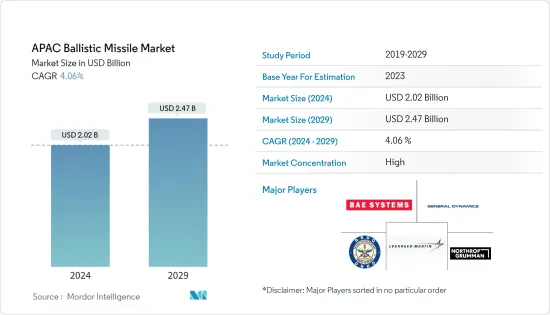PUBLISHER: Mordor Intelligence | PRODUCT CODE: 1537643

PUBLISHER: Mordor Intelligence | PRODUCT CODE: 1537643
APAC Ballistic Missile - Market Share Analysis, Industry Trends & Statistics, Growth Forecasts (2024 - 2029)
The APAC Ballistic Missile Market size is estimated at USD 2.02 billion in 2024, and is expected to reach USD 2.47 billion by 2029, growing at a CAGR of 4.06% during the forecast period (2024-2029).

Key Highlights
- During 2022, China's defense expenditure witnessed a 4.3% YoY growth and amounted to USD 292 billion. The rise in defense expenditure was due to growth in territorial dispute order issues with India, increasing face-offs with the US in the disputed South China Sea, and claims over Taiwan are some of the reasons for China to aggressively modernize its weaponry and equipment.
- A long R&D cycle may expose the market players to liquidity crunch or macroeconomic downturns. This may deleteriously affect their production capabilities and hence restrict their contribution to the market.
- The improvement in the guidance, accuracy, and flexibility of ballistic missiles has reinforced their effectiveness in military operations, thereby enhancing their appeal, prevalence, and usage. The development of technologies aimed at improving accuracy has involved the monitoring of flight paths through various methods, including terrestrial radar, optical sensors, radar imaging, and navigation and positioning satellites.
APAC Ballistic Missile Market Trends
Intercontinental Segment to Witness Highest Growth During the Forecast Period
- The demand for intercontinental ballistic missiles (ICBM) is driven by factors such as high accuracy over other small, medium, and intermediate-range missiles; intercontinental-range missiles are being researched and developed by the countries in the region. The defining feature of an ICBM is its intercontinental range, capable of spanning continents and oceans. With a minimum range of 5,500 km, these missiles can travel much farther, making them a preferred choice for long-range strategic operations.
- Countries are investing significant resources towards the development of ICBMs. On this note, North Korea has been developing several ICBMs indigenously due to the imposed international defense sanctions. For instance, in October 2022, North Korea conducted its longest-range missile test over Japan. In November 2022, North Korea test-fired 22 missiles at once; one of these missiles was launched toward Ulleung Island in South Korea. Such developments are likely to fuel the growth of the ballistic missile market in the Asia-Pacific region over the forecast period.
India is Anticipated to Dominate the Market
- India is the third-largest defense spender in the world and the second-largest in the Asia-Pacific region. In 2022, India's defense spending was USD 81.4 billion compared to USD 76.5 billion in 2020. For FY 2022-23, the budget stands at USD 54.2 billion (excluding the component of defense pensions). The capital outlay that focuses on the modernization of the armed forces grew by 12.82%, with an allocation of USD 20.36 billion.
- India is also focused on the indigenous development of the ballistic missiles. On this note, 68% of the capital procurement was proposed to be earmarked for the domestic industry compared to 58% in FY 2021-22. For instance, in September 2022, the Defense Ministry of India signed a contract with BrahMos Aerospace for the procurement of additional dual-role capable surface-to-surface BrahMos missiles under the "Buy Indian" category for INR 1,700 crores (USD 210 million). Also, in June 2022, India tested its nuclear-capable surface-to-surface ICBM from the Dr. APJ Abdul Kalam Island. Such developments render a positive outlook for the market in focus during the forecast period.
APAC Ballistic Missile Industry Overview
The APAC ballistic missile market is consolidated in nature with the presence of few players holding significant shares in the market. Some of the prominent players in the APAC ballistic missile market are the Defense Research and Development Organisation, Mitsubishi Heavy Industries, Ltd., Kawasaki Heavy Industries, Ltd., Bharat Dynamics Limited (BDL), and BAE Systems plc, amongst others.
Various major players in the region are now constantly looking forward to developing advanced ballistic missiles and integrating new technologies, thereby leading to product differentiation in terms of attack range and functionality.
Furthermore, the key players in the market are also now looking to establish partnerships with new-age technology companies that are gradually increasing their investments in terms of technological advancement. Thus, growing partnerships between defense companies and new-age technology companies and the growing investments in advanced technologies such as augmented reality and artificial intelligence will lead to increasing opportunities for new players to enter the market and gain greater market share, thereby leading to growth in the market during the forecast period.
Government investments in state-owned companies for the development of advanced ballistic missiles are helping the regional players increase their presence in the market.
Additional Benefits:
- The market estimate (ME) sheet in Excel format
- 3 months of analyst support
TABLE OF CONTENTS
1 INTRODUCTION
- 1.1 Study Assumptions
- 1.2 Scope of the Study
2 RESEARCH METHODOLOGY
3 EXECUTIVE SUMMARY
4 MARKET DYNAMICS
- 4.1 Market Drivers
- 4.2 Market Restraints
- 4.3 Porter's Five Forces Analysis
- 4.3.1 Threat of New Entrants
- 4.3.2 Bargaining Power of Buyers/Consumers
- 4.3.3 Bargaining Power of Suppliers
- 4.3.4 Threat of Substitute Products
- 4.3.5 Intensity of Competitive Rivalry
5 MARKET SEGMENTATION
- 5.1 Launch Mode
- 5.1.1 Surface
- 5.1.1.1 Surface-to-Surface
- 5.1.1.2 Surface-to-Air
- 5.1.2 Air
- 5.1.2.1 Air-to-Surface
- 5.1.2.2 Air-to-Air
- 5.1.3 Sub-sea
- 5.1.3.1 Subsea-to-Air
- 5.1.1 Surface
- 5.2 Range
- 5.2.1 Short-Range
- 5.2.2 Medium-Range
- 5.2.3 Intermediate-Range
- 5.2.4 Intercontinental
6 Geography
- 6.1 China
- 6.2 India
- 6.3 Japan
- 6.4 South Korea
- 6.5 Rest of Asia-Pacific
7 COMPETITIVE LANDSCAPE
- 7.1 Vendor Market Share
- 7.2 Company Profiles
- 7.2.1 BAE Systems plc
- 7.2.2 General Dynamics Corporation
- 7.2.3 Lockheed Martin Corporation
- 7.2.4 Northrop Grumman Corporation
- 7.2.5 Defence Research and Development Organisation
- 7.2.6 The Boeing Company
- 7.2.7 RTX Corporation
- 7.2.8 China Aerospace Science & Industry Corporation Limited
8 MARKET OPPORTUNITIES AND FUTURE TRENDS




